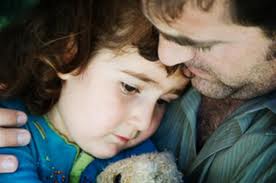Six Ways To Parent Anxious Children
 At one time or another many of our children experience anxiety, worry, fear, and/or nervousness. As parents we lament our children's suffering as it is our job to try to protect them. So when our children have anxiety-which is suffering-we panic. This, of course, is the worst thing to do. We are teaching them that their fear is something to fear.
At one time or another many of our children experience anxiety, worry, fear, and/or nervousness. As parents we lament our children's suffering as it is our job to try to protect them. So when our children have anxiety-which is suffering-we panic. This, of course, is the worst thing to do. We are teaching them that their fear is something to fear.
We must keep in mind that it is not fear that is the problem. Fear is biological and can be appropriate. (This fear can pass quickly.) When children experience anxiety, it is the fear of the fear that is the problem. In other words- it is the meaning we make around the fear that matter most to our mental state.
How to Parent Anxious Children
1. Model calmness. Children are going to take their cue from you. Last night my daughter was worried about a pick up- whether we'd remember her-and I explained to her why I would and that there was a safe back up to ease her mind. She said to me, "You are never worried about anything." (Little did she know, I was worse than her!)
I always tell her to look at my face if you are worried, only if I am worried, do you need to be. Her fears are huge to her, but they wane when she can't convince me to be afraid.
2. Hold confidence for them. Be confident that your children are OK, even though they have anxiety. This is just an experience and every bout with anxiety is an opportunity to get rid of it. List off for your kids which skills you think they have to get over this. This will help them to step into those skills more readily. Confidence, like worry, is contagious. You want this to pass on.
3. Talk out their fears. Children's anxieties loom much larger while in their head. Get them out. Once children say them out loud, it takes the fears down a notch. Kids get worried if they talk about them, they might get worse. But they usually don't. They get better. Sometime you can then talk about why they don't need to be afraid, reassure them, or show how silly the Anxiety is.
4. Personify the Anxiety. Another helpful thing to do is personify the Anxiety. Kids often feel the worry is part of their identity, this makes them feel more out of control. Giving the worries a separate identity, separates them from the child's and can be very helpful in helping kids feel empowered.
5. Tell why he or she does not need to be afraid. (This will work best if you are convinced. Do your own work first. Or do it together!) For example, if they are afraid of you getting sick, list for them the things you do to keep yourself healthy. Action conquers fear.
6. Take action. Helplessness makes us feel out of control. Giving them something to do can help them counter fear. For example, in response to tragedy, making food or another donation can replace helpfulness with helplessness, giving children confidence.
Try these and see how it goes! Tell me. What works for you?
APA Reference
Lobozzo, J.
(2013, January 9). Six Ways To Parent Anxious Children, HealthyPlace. Retrieved
on 2025, November 26 from https://www.healthyplace.com/blogs/anxiety-schmanxiety/2013/01/six-ways-to-parent-children-through-anxiety
Author: Jodi Lobozzo Aman, LCSW-R
I work with anxious students daily. I have been trying a technique I have coined the thought exchange. I make personalized boxes for my students for this process.
Hi Ramona,
Thank you for sharing your technique. The idea of a thought exchange sounds like a very effective one for kids and adults. Replacing anxious thoughts with healthy ones is a great approach.
Sometimes, anxiety may arise if the child is not prepared for certain tasks. Thus, keeping a routine for day-to-day activities may facilitate in ensuring that the child is prepared to accomplish the various tasks or activities required.
Sure, but an inflexible child, will get very anxious if something changes. xo Jodi